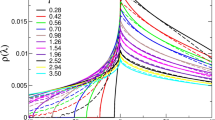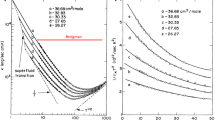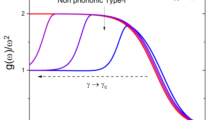Abstract
THE normal mode representation1 of the excitations in liquid helium describes the thermodynamic behaviour below the lambda point as the vibrational modes among a temperature dependent population of diatomic rotors. The excitation spectrum has now been obtained from the theory on the assumption of an observed empirical relation.
This is a preview of subscription content, access via your institution
Access options
Subscribe to this journal
Receive 51 print issues and online access
$199.00 per year
only $3.90 per issue
Buy this article
- Purchase on Springer Link
- Instant access to full article PDF
Prices may be subject to local taxes which are calculated during checkout
Similar content being viewed by others
References
Borst, L. B., Nature, 204, 870 (1964).
Henshaw, D. G., and Woods, A. D. B., Phys. Rev., 121, 1270 (1961).
Rayfield, G. W., and Reif, F., Phys. Rev., 136, A, 1194 (1964).
Author information
Authors and Affiliations
Rights and permissions
About this article
Cite this article
BORST, L. Dispersion Relation in Liquid Helium. Nature 209, 187–188 (1966). https://doi.org/10.1038/209187a0
Issue Date:
DOI: https://doi.org/10.1038/209187a0
Comments
By submitting a comment you agree to abide by our Terms and Community Guidelines. If you find something abusive or that does not comply with our terms or guidelines please flag it as inappropriate.



